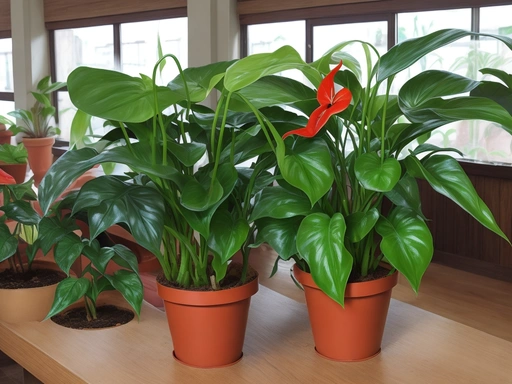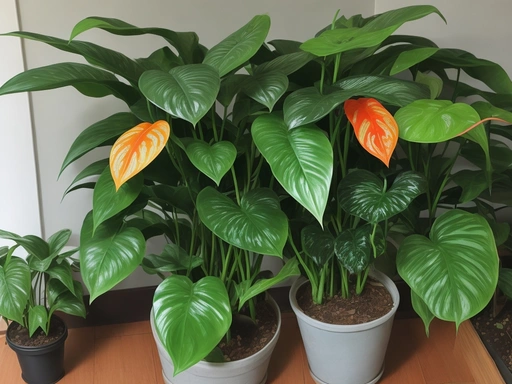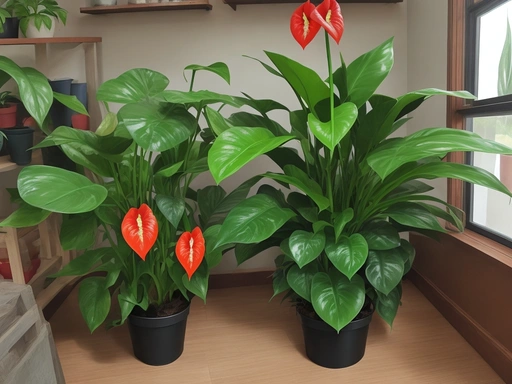Anthurium and Sustainable Gardening: A Blooming Partnership!
Key Takeaways:
- Anthurium plants are a sustainable choice for indoor gardening due to their ability to purify the air.
- With proper care and maintenance, Anthurium plants can thrive in low-light conditions, making them suitable for various indoor environments.
- Sustainable gardening with Anthuriums involves using organic fertilizers and practicing water conservation.
- Anthurium plants have a long lifespan, making them a durable and eco-friendly choice for home gardening.
Are you looking to create a sustainable garden that not only beautifies your space but also benefits the environment?
Look no further than Anthurium plants! With their stunning flowers and low maintenance requirements, Anthuriums are the perfect addition to any sustainable gardening project.
In this article, I will take you through the beauty of Anthurium plants, share care tips for sustainable gardening, and explain why Anthuriums are a great choice for promoting soil conservation.
Get ready to cultivate a green space that not only thrives but also helps protect our planet.
| Topic | Anthurium and Sustainable Gardening |
| What is Anthurium? | Anthurium is a popular houseplant known for its striking, heart-shaped flowers and glossy leaves. It comes in a variety of vibrant colors and is native to tropical regions of America. |
| Why is Anthurium a sustainable plant? | Anthurium is considered a sustainable plant because: |
| 1. Air Purification | It helps improve air quality by filtering harmful toxins such as formaldehyde, xylene, and ammonia. |
| 2. Low Water Requirements | Anthurium requires minimal water compared to many other houseplants, making it an eco-friendly choice. |
| 3. Longevity | With proper care, Anthurium plants can live for several years, reducing the need for frequent replacements and consumption. |
| 4. Easy Propagation | Anthurium can be easily propagated through division or stem cuttings, allowing gardeners to expand the plant population without resorting to unsustainable practices. |
| 5. Versatility | It can be grown in various settings, including indoor gardens and greenhouses, making it an adaptable choice for sustainable gardening projects. |
| Pros of Anthurium in sustainable gardening | – Enhances indoor air qualityn- Requires little maintenancen- Adds aesthetic appeal to any spacen- Promotes biodiversity in green spaces |
| Cons of Anthurium in sustainable gardening | – Can be toxic to pets if ingestedn- Requires specific growing conditions and caren- Some varieties are susceptible to pests and diseases |
What is Anthurium?
Anthurium is a tropical flowering plant known for its vibrant, heart-shaped blooms and glossy, dark green leaves.
The beauty of Anthurium plants
Anthurium plants are incredibly beautiful with their glossy, heart-shaped leaves and vibrant, long-lasting flowers. They come in a wide range of colors, including red, pink, white, and even green.
The shiny foliage and glossy flowers make Anthuriums a stunning addition to any home or garden.
Anthurium care tips for sustainable gardening
For sustainable gardening, here are some care tips for Anthurium plants:
- Place Anthurium plants in well-draining soil to prevent waterlogging.
- Water the plants moderately, allowing the top layer of soil to dry out before watering again.
- Use organic fertilizers to nourish the plants and avoid chemical-based products.
- Provide ample indirect sunlight, as Anthuriums thrive in bright butKeeping Anthurium plants indoors can help create— wp:list-item –>
- Keep the plants at the right temperature, between 60-80°F (15-27°C, and avoid extreme fluctuations.
- Control pests and diseases using natural remedies and avoid harmful chemicals whenever possible.
- Avoid over-fertilizing, as it can harm both the plants and the environment.

Benefits of Anthurium in sustainable gardening
Anthurium plants offer several benefits in sustainable gardening.
Firstly, they require low maintenance, making them ideal for busy gardeners.
Anthurium plants have the ability to purify indoor airindoor air, improving the air quality in your home.
Lastly, these plants can thrive in various light conditions, making them versatile and adaptable to different environments.
Overall, Anthurium plants are a great addition to any sustainable garden.

Sustainable Gardening Practices
To practice sustainable gardening, focus on understanding its principles and their importance for the environment.
Understanding sustainable gardening
Understanding sustainable gardening means practicing gardening methods that are environmentally friendly, conserve resources, and promote ecosystem health.
It involves techniques like composting, using organic fertilizers, and conserving water.
Sustainable gardening aims to reduce waste, protect biodiversity, and support a healthy and balanced ecosystem.
It is about working with nature rather than against it to create a harmonious and long-lasting garden.

Importance of sustainable gardening for the environment
Sustainable gardening is important for the environment because it promotes biodiversity, conserves resources, and reduces pollution.
It helps maintain healthy soil, conserves water, and supports beneficial insects and wildlife.
By practicing sustainable gardening, we can contribute to a healthier, more resilient ecosystem for ourselves and future generations.

Why Anthurium is great for sustainable gardening
Anthurium is a fantastic choice for sustainable gardening due to its low maintenance requirements and ability to purify indoor air, making it an eco-friendly and health-conscious plant.
Low maintenance requirements of Anthurium plants
Anthurium plants are low maintenance, making them a great choice for sustainable gardening. They require indirect light, moderate watering, and well-draining soil.
They are resilient and can handle some neglect.
Plus, they don’t need frequent fertilizing or repotting. Anthuriums are perfect for busy plant parents!
Ability of Anthurium to purify indoor air
Anthurium plants have the ability to purify indoor air by removing harmful toxins such as formaldehyde, xylene, and ammonia. They have specialized leaves that effectively absorb and neutralize these pollutants, improving the air quality in your home or office.
Keeping Anthurium plants indoors can help create a healthier and cleaner living environment.
Anthurium’s ability to thrive in various light conditions
Anthurium plants are known for their versatility when it comes to light conditions. They can thrive in both bright, indirect light as well as lower light environments.
This makes them perfect for different areas of your home or office, whether it’s near a sunny window or in a spot with limited natural light.
Just be sure to avoid direct sunlight, as it can damage their leaves. Anthurium’s adaptability to varying light conditions makes them a great choice for sustainable gardening in different settings.
Anthurium and soil conservation
Anthurium plays a crucial role in soil conservation.
Anthurium’s ability to improve soil health
Anthurium plants can improve soil health by enhancing its fertility and structure. The roots of Anthurium secrete organic compounds that promote the growth of beneficial microorganisms in the soil.
These microorganisms break down organic matter and release nutrients, making the soil more nutrient-rich.
Additionally, Anthurium’s dense and fibrous root system helps prevent soil erosion and improves water retention. All of these factors contribute to a healthier and more sustainable soil ecosystem.
How Anthurium prevents erosion
Anthurium plants prevent erosion by developing a dense network of roots that anchor the soil in place.
These roots help to hold the soil together during heavy rain or strong winds, reducing the chances of soil erosion.
Additionally, the large leaves of Anthurium plants act as a natural barrier, preventing rainwater from directly hitting the soil and causing erosion.
Using Anthurium in soil conservation practices
Anthurium plants can contribute to soil conservation practices in a few ways.
Firstly, their root systems help prevent erosion by binding the soil together.
Secondly, their organic matter improves soil health and fertility.
Lastly, Anthurium plants can be used as a cover crop, protecting the soil from erosion and reducing water runoff.
Growing Anthurium sustainably
Growing Anthurium sustainably means choosing organic fertilizers, practicing proper watering techniques, and implementing pest and disease control in an eco-friendly manner.
Choosing organic fertilizers for Anthurium plants
Choosing organic fertilizers for Anthurium plants is important for sustainable gardening.
Look for fertilizers that are specifically made for houseplants, as they provide the right nutrients for Anthuriums.
Organic options like compost, worm castings, and fish emulsion are great choices as they are chemical-free and environmentally friendly.
Ensure you follow the instructions on the package for proper application.
Watering practices for sustainable Anthurium growth
To ensure sustainable Anthurium growth, it’s important to follow proper watering practices.
Here’s what you need to know:
- Water moderately: Anthuriums prefer moist soil, but they don’t like to be waterlogged. Allow the top inch of soil to dry out before watering again.
- Use well-draining soil: Anthuriums don’t like to sit in water, so make sure the soil has good drainage. Use a pot with drainage holes and a well-draining potting mix.
- Water at the base: Instead of watering the leaves, water at the base of the plant. This prevents fungal diseases and helps the roots absorb water efficiently.
- Avoid overwatering: Overwatering can lead to root rot and other issues. Stick your finger into the soil; if it feels moist, wait before watering again.
- Monitor humidity: Anthuriums prefer higher humidity levels. You can increase humidity by placing a tray of water near the plant or using a humidifier.
Remember, every plant has different watering needs, so it’s essential to observe your Anthurium and adjust the watering frequency accordingly.
Pest and disease control in a sustainable way
In sustainable gardening, pest and disease control can be achieved through natural and eco-friendly methods. Here are a few tips:
- Encourage beneficial insects like ladybugs and lacewings, as they prey on pests.
- Practice crop rotation to disrupt pest life cycles and reduce their population.
- Use organic insecticides and fungicides made from natural ingredients.
- Maintain healthy soil by adding compost and organic matter, as healthy plants are more resistant to diseases.
- Regularly inspect your plants for signs of pest or disease, and take prompt action to prevent further spread.
- Practice good hygiene by keeping your garden clean and removing any infected or infested plants.
By adopting these sustainable pest and disease control practices, you can ensure a healthy and thriving garden without harming the environment.
Frequently Asked Questions
Can Anthurium plants survive in low light conditions?
Yes, Anthurium plants can survive in low light conditions.
While they prefer bright, indirect light, they are known to tolerate lower light levels.
However, it’s important to note that insufficient light may affect their growth and flowering.
To ensure their survival in low light, you can place them near a north-facing window or provide artificial light sources like grow lights.
How often do Anthurium plants need to be watered?
Anthurium plants should be watered thoroughly when the top inch of soil becomes dry.
Touch the soil with your finger to check for dryness.
Keep in mind that overwatering can lead to root rot, so it’s important to allow the soil to dry out slightly between waterings.
Are there any natural remedies for pest control in Anthurium plants?
Yes, there are natural remedies for pest control in Anthurium plants. Here are a few options:
- Neem oil: This organic solution can be mixed with water and applied to the plant’s leaves to repel pests.
- Soap spray: Diluted dish soap can suffocate pests like aphids and mites. Apply the spray to affected areas.
- Companion planting: Grow plants like marigolds or garlic near Anthuriums to deter pests naturally.
- Manual removal: If you spot pests, simply pick them off the plant by hand and dispose of them properly.
Remember to always test treatments on a small area of the plant before applying them to the entire plant.
Final Verdict
Anthurium plants are not only stunningly beautiful, but they also serve as a perfect addition to sustainable gardening practices. With their low maintenance requirements, ability to purify indoor air, and adaptability to various light conditions, Anthurium plants are a must-have for any eco-conscious gardener.
Furthermore, Anthurium’s role in soil conservation, improving soil health, and preventing erosion makes it an important player in sustainable gardening efforts.
By following sustainable practices such as choosing organic fertilizers, practicing proper watering techniques, and employing natural remedies for pest control, you can ensure the sustainable growth of your Anthurium plants. Embracing Anthurium in your gardening endeavors not only contributes to a healthier and greener environment but also brings lasting beauty and joy to your space.
So go ahead and incorporate Anthurium into your sustainable gardening routine to enjoy its benefits while making a positive impact on the planet.




